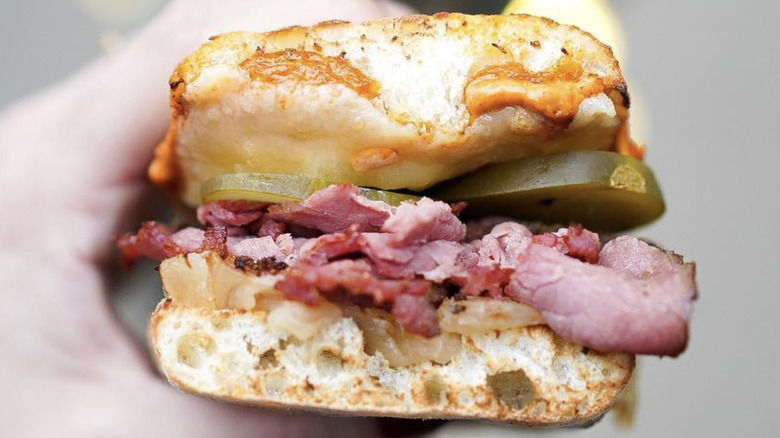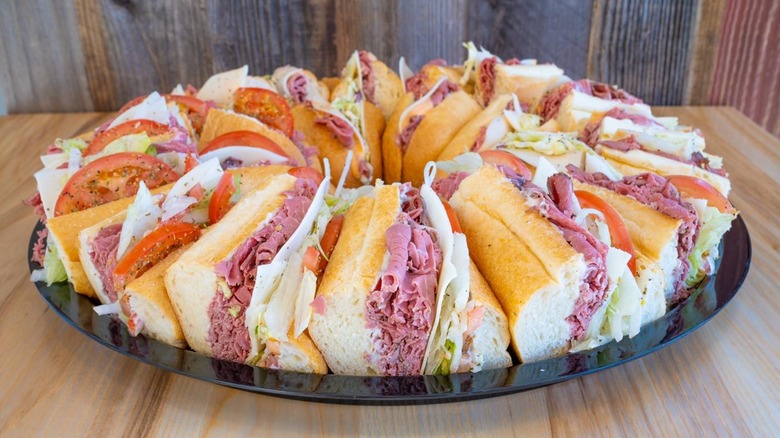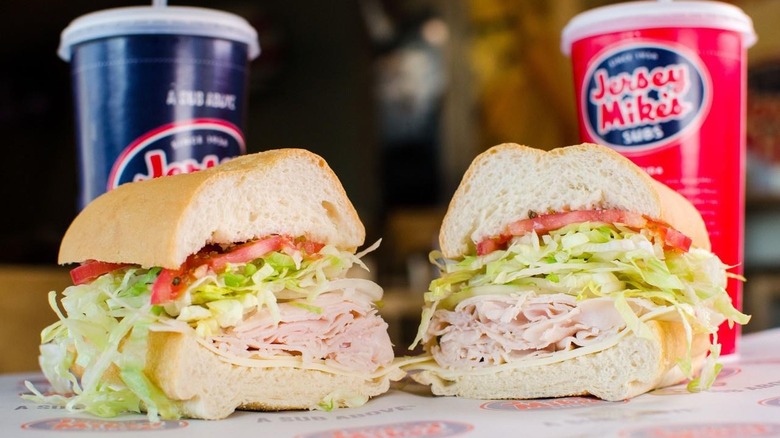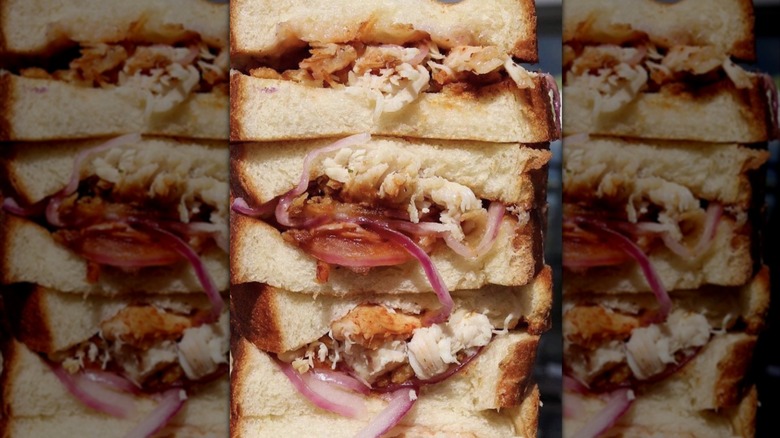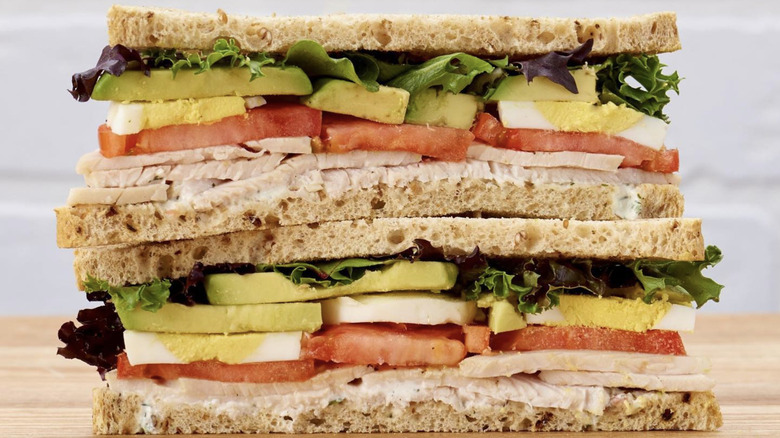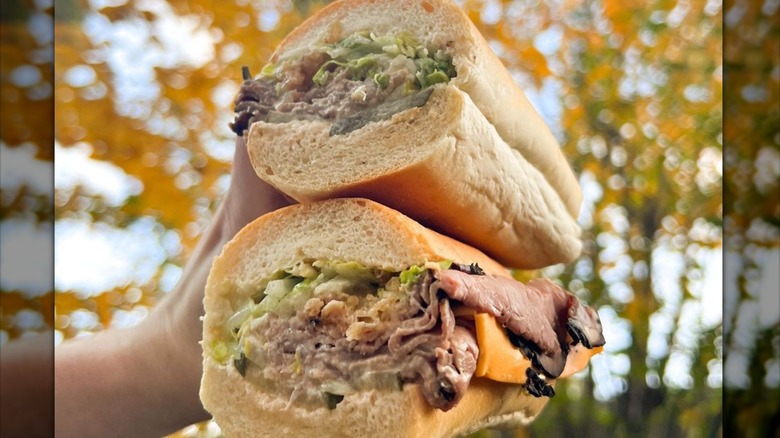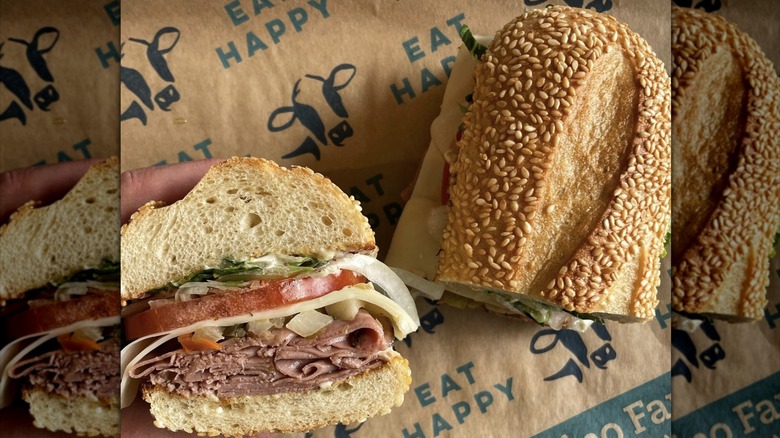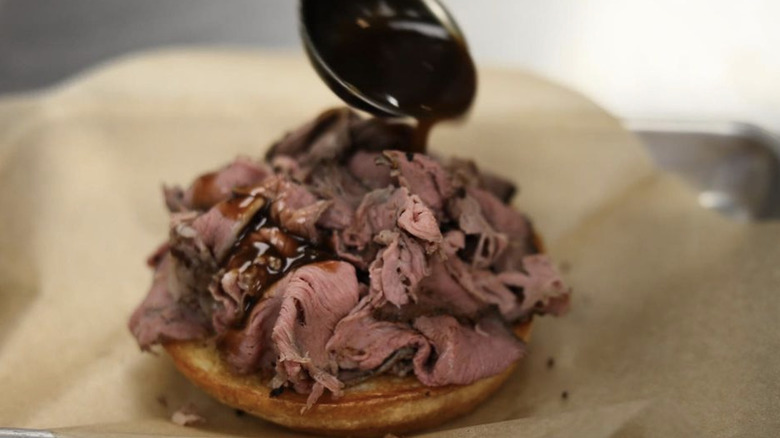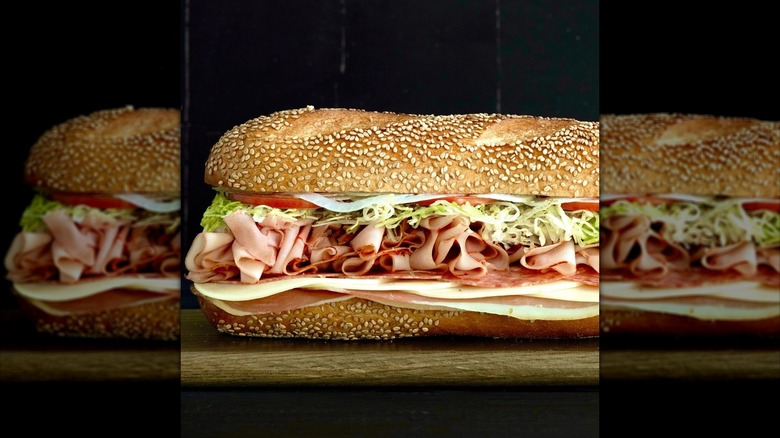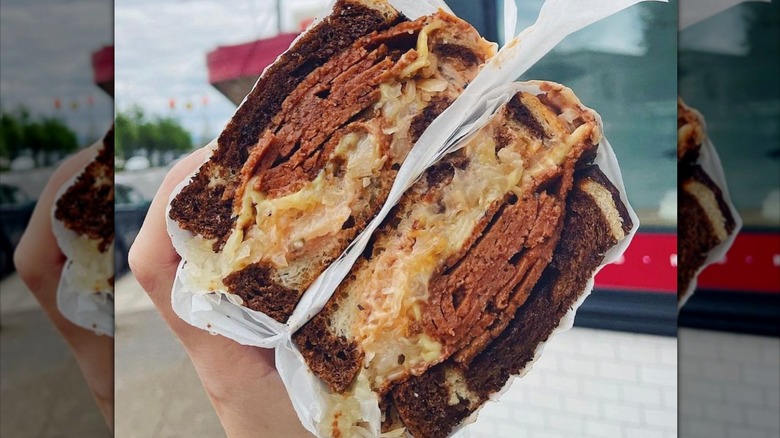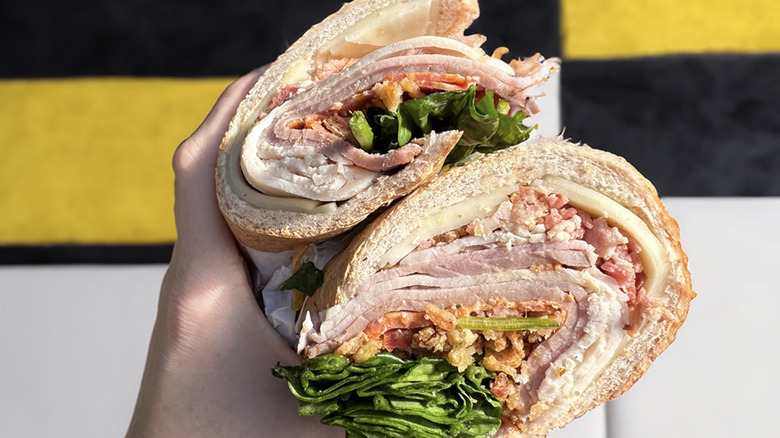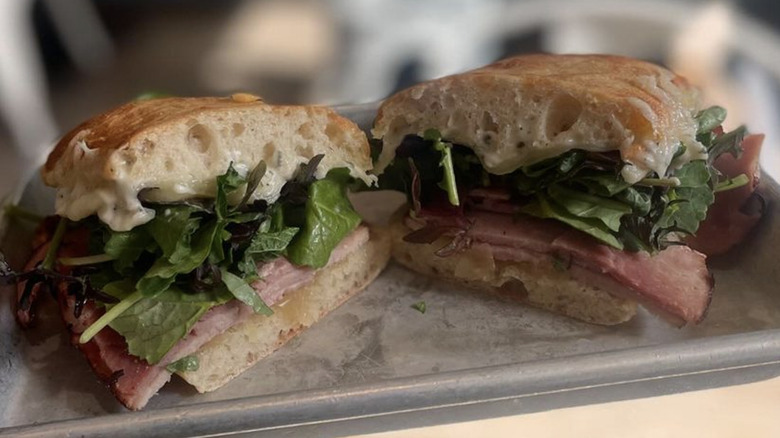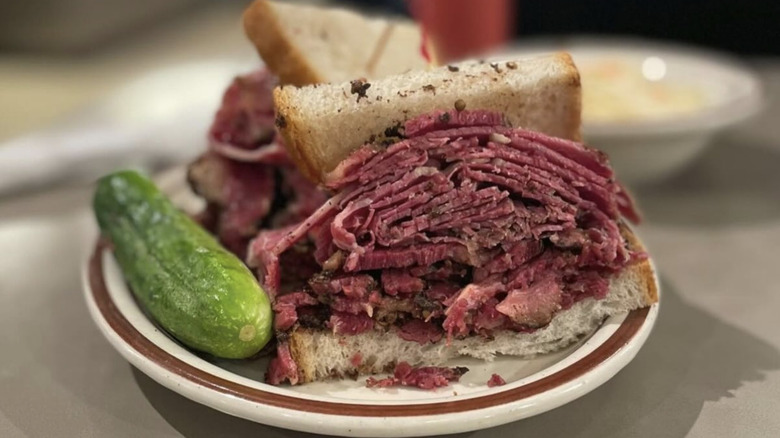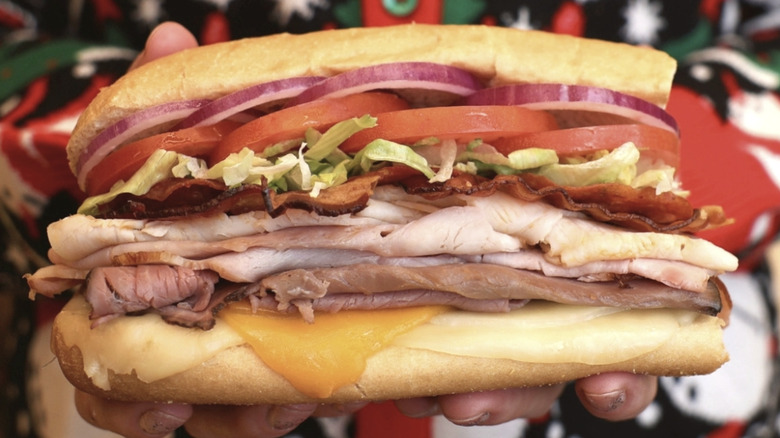Sandwich Chains That Serve The Highest Quality Deli Meats
There's something about a delicious deli sandwich that stays with you. It's a satisfying, seemingly simple meal that becomes your go-to order. You even tell your friends about it. This is exactly what sandwich chains are hoping for — in fact, they're counting on it. The fast casual market is packed with sandwich chains, and the quality of deli meat you'll find at these places is all over the map. Pinpointing the chains that serve the highest quality meats isn't easy, and that's why we're here to help.
When looking for a sandwich chain that prioritizes high-quality deli meat, a reputation for consistency goes a long way. We must also recognize the changes happening within consumer culture. More than ever before, people care about where their deli meat comes from and how it's processed. Several popular sandwich chains have made commendable efforts to make all-natural, sustainably-sourced meat the company standard, while others have failed to modernize their menus. We'll get more detailed about our methods for determining deli meat quality at the end of the article.
Let's face it, even deli meat that is minimally processed and comes from humanely raised animals isn't going to be the healthiest or most environmentally friendly thing you can eat. Deli meats are high in sodium and contain chemically-engineered preservatives. Plus, preparing meat for human consumption requires a lot of water. But for those days when only a deli sandwich will do, consider visiting these chains to get the highest quality meat.
Capriotti's Sandwich Shop
Since its founding in 1976 in Wilmington, Delaware, Capriotti's Sandwich Shop has never wavered from the idea that customers deserve sandwiches made from high-quality ingredients. When siblings Lois and Alan Margolet started Capriotti's, they built the menu from foods they loved growing up — whole roasted turkey, fresh bread, and delicious meats, and cheeses. Capriotti's Sandwich Shop is named for the duo's maternal grandfather, Philip Capriotti, who cultivated their passion for homestyle Italian eats.
Decades later, Capriotti's is a major sandwich chain, with over 175 U.S. locations. Much of Capriotti's success is due to the company's well-established relationships with product suppliers. Its signature turkey is from the Butterball brand — but Capriotti's version isn't your average bird. Capriotti's Super Tom is a line of turkeys that Butterball raises exclusively for the chain. The turkey is slow-roasted overnight and pulled apart by hand. It's also the key ingredient in Capriotti's award-winning sandwich, " The Bobbie" where it's layered with cranberry sauce and handmade stuffing.
In 2020, Capriotti's added American Wagyu beef to its menu. This high-end addition was made possible through the chain's collaboration with Snake River Farms, an esteemed beef proprietor that has produced its innovative American Wagyu beef since the late 1980s. Snake River Farms' American Wagyu beef is cultivated from meticulously bred cattle raised on an all-vegetarian diet. The all-natural meat is free of growth hormones, MSG, and artificial ingredients.
Jersey Mike's
One of the reasons Jersey Mike's became a bonafide giant of the sandwich chain industry is that it never let the quality of its sandwiches slip. Jersey Mike's manages to keep its nearly 3,000 locations stocked in high-quality deli meat because slicing the product to order has always been the standard practice. Customers know this, franchisees know this, and clearly the business model is working.
Jersey Mike's original Jersey Shore location opened in 1956 under the name Mike's Subs. Freshly sliced meat, bread rolls baked in house, and customizable sandwich ingredients helped Mike's gain a steady following, and in turn led to the shop's expansion. Jersey Mike's became a franchise in 1987, but every location serves private label deli meats made especially for the chain. At Jersey Mike's you're getting USDA Choice Roast Beef and lean, whole-muscle meat turkey, free of fillers. Jersey Mike's has served antibiotic-free turkey since 2017.
There's also good news for the ham, prosciuttini, cappacuolo, and bacon-lovers out there. In 2019, Jersey Mike's teamed up with Clemens Food Group out of Hatfield, Pennsylvania to make the company-wide switch to No Antibiotics Ever (NAE) pork products. The pigs from which Clemens Food Group procures its meat are raised in cage-free environments, feed on an all-vegetarian diet, and are never given hormones, growth promotants, or steroids.
Panera Bread
With nearly 2,200 locations throughout the U.S. and Canada, Panera Bread is one of the top sandwich chains in the business. Panera's rise to prominence was born out of the public's desire for tasty sandwich options without all the processed ingredients associated with fast food. In fact, Panera was one of the first sandwich chains to serve antibiotic-free chicken. As the shift toward food sustainability and humanely-raised meat becomes the standard, Panera has been dedicated to offering customers deli meat options they can feel good eating.
Since 2016, Panera has participated in the Better Chicken Commitment, an initiative that sees companies work toward serving only high-quality breeds of broiler chicken that are raised in spacious environments, given exposure to daylight, and harvested ethically. By 2017, Panera proclaimed that its menu was completely free of artificial additives. Rather than enrich turkey deli meat with chemical preservatives, Panera worked with a supplier that uses water, potato starch, and sea salt to preserve the meat naturally.
A menu overhaul in 2024 has invited suspicion that Panera's clean food supply chain — once a huge source of pride for the eatery — could be changing. In an internal memo obtained by Nation's Restaurant News, Panera Bread execs stated, "This policy update allows for judicious use of antibiotics in our pork and turkey products and provides more flexibility in our feeding standards for chicken and beef, allowing us to consider additional sources of supply and more effective pricing".
Pret A Manger
Pret A Manger's slogan is "Doing the right thing", and it's nice to see that the international chain is staying true to its word. Perhaps best-known for its many New York City locations (42 to be exact), Pret A Manger, a sandwich chain that got its start in London, England in 1986, has been particularly transparent about its efforts to serve high-quality, deli meat. Pret a Manger U.S. has detailed its journey toward environmental stability by disclosing the details of its first Environment, Social Governance report on the company website. The website also gives customers deeper insight on where the chain's deli meats are sourced.
The meats featured on Pret A Manger's American menu are ham, bacon, and chicken. All of Pret A Manger's pork products come from an American farming network called Niman Ranch. The farmers and ranchers participating with Niman Ranch raise livestock according to the highest animal welfare standards.
In 2017, Pret A Manger signed onto the Better Chicken Commitment. This international program provides participating companies with a set of industry-leading standards regarding the production of chicken meat. Under Version 1 guidelines of the Better Chicken Commitment, Pret A Manger vows that by 2026, all of its chicken products will be Global Animal Partnership (G.A.P.) certified. Currently, 90% of Pret A Manger's chicken meets the G.A.P. standard.
Jimmy John's
Before it became a massive American sandwich chain, in 1983 Jimmy John's started as a late-night sub shop near a popular bar-hopping area in the college town of Charleston, Illinois. Today, Jimmy John's has more than 2,600 locations across 45 states. When you think of high-quality deli meat, Jimmy John's probably isn't the first spot that comes to mind. The chain — notorious for selling untoasted subs — lacks the sophistication of some of its competitors, but Jimmy John's takes meat sustainability more seriously than one might expect.
Initially, Jimmy John's use of high-quality deli meat was motivated by founder and former CEO Jimmy John Liautaud's community-oriented nature. Liautaud made supporting local farmers and vendors part of the chain's business strategy early on. Not only was this helpful to the local economy, but it also provided customers with better tasting sandwich ingredients. Jimmy John's previous attempts at posturing itself as an environmentally-conscious brand weren't entirely convincing, especially after Liautaud came under fire for hunting big game. Liautaud sold the majority of his stake in Jimmy John's to Roark Capital in 2016.
Under new direction, sustainable sourcing is a key focus. Jimmy John's oversees the largest third-party remote video auditing system in the meat industry to make sure that the chickens served in its sandwich shops are raised ethically. Jimmy John's hand-sliced meats are all-natural and minimally processed (although its roast beef does contain artificial caramel color).
Mendocino Farms
Serving nothing but delicious, sustainably-sourced food has been the goal of Mendocino Farms since it opened in Los Angeles in 2005. Back then, farm-to-table cuisine wasn't the bankable concept that it is today, but for family-run Mendocino Farms, nothing less would do. Mendocino Farms' deli meat is of exceptional quality, but where the eatery really hits a home run is its unique, chef-driven sandwich options.
Mendocino Farms was an 11-unit chain in 2015 when Whole Foods took notice. Whole Foods has brought many restaurants into its stores over the years, but Mendocino Farms was the first one the grocery store invested in. Mendocino Farms began operating out of Whole Foods in California in November 2016 while also continuing to open individual locations. Sustainable, local farms are the backbone of Mendocino Farms' meat supply. All of the meats the chain serves are raised humanely, feed on a vegetarian diet, and do not contain any artificial colors, flavors, or hormones. All of the poultry is 100% antibiotic-free.
Customers' appreciation for Mendocino Farms' carefully cultivated ingredients has caught on. The chain boasts more than 60 locations throughout California, Texas, and Washington state. Mendocino Farms' sandwiches rotate throughout the year in order to showcase an array of seasonal foods. Beloved deli meat sandwiches like Prosciutto & Chicken and The Farm Club are permanent menu items.
Top Round
Sandwiches made from scratch are a way of life at Top Round, a sandwich chain established in Los Angeles in 2013 as a passion project for the four founding restaurant chefs (now five chefs) looking to start something of their own. Top Round isn't your traditional deli, it's more of a retro-inspired sandwich and burger joint (with frozen custard!), but that doesn't mean that the quality of roast beef is anything less than top-notch. Since its debut, Top Round has grown into a small chain with locations in L.A., Fort Lauderdale, Florida, and soon, Las Vegas.
To make its Midwest-style roast beef sandwiches, Top Round uses 100% all-natural beef, free of fillers, artificial additives, and preservatives. A 10-spice rub is applied to the meat before it is marinated and then slow-roasted for 10 hours. It's a riff on a time-honored sandwich, elevated through the collective vision of Top Round's founding chefs.
Top Round marinates and slow-cooks its roast beef in 20-pound portions and slices the meat to order. The meat is topped with natural jus before being sandwiched between a toasted and buttered bun. Top Round's franchising efforts haven't grown as rapidly as other sandwich chains, but you can expect a consistent level of quality at any of its existing locations.
PrimoHoagies
Hoagie shops in the greater Philadelphia area (which includes the southwestern border of New Jersey) are easy to come by, but PrimoHoagies is in a class of its own. PrimoHoagies opened in 1992 in South Philadelphia – not far from the Hog Island shipyard where the hoagie was created in the 1910s. After 10 years in business, PrimoHoagies became a franchise, a move that helped the gourmet sandwich shop grow from a single location to over 120. Serving top-quality deli meats has also been a big contributor to PrimoHoagies' success.
The chain exclusively uses Thumann's gourmet meats and cheeses to craft its hoagies. Thumann's is a fourth-generation, family-owned deli wholesaler out of New Jersey that has been in operation since 1949. All of Thumann's deli meats are produced from family recipes and use the least amounts of sugar and salt possible. There are no by-products, fillers, gluten, MSG, or chemically engineered ingredients in Thumann's meats.
In 2023, PrimoHoagies was voted the Best Sandwich or Sub Shop in the USA Today 10Best Readers' Choice Awards. It's a telling honor for the sandwich chain, which is expanding rapidly across the U.S. PrimoHoagies currently has locations in Colorado, Delaware, Florida, Massachusetts, Maryland, Louisiana, North Carolina, New Jersey, New York, Pennsylvania, South Carolina, and Texas. If PrimoHoagies isn't already in a state near you, it might be soon.
Ben & Esther's
Vegan deli meat? Skeptics might be critical of what's going on at Ben & Esther's, but meatless deli meats deserve quality care too. Ben & Esther's Vegan Jewish Deli opened in Portland, Oregon in late 2019. Despite pandemic-era woes, the eatery managed to open a second location in San Diego. A third in Seattle, was shuttered in December 2023. Setbacks aside, Ben & Esther's represents something truly special in the fast casual sandwich market, and its quality "deli meats" are worthy of recognition.
One of Ben & Esther's signature items is the Reuben. The vegan version swaps the traditional corned beef for seasoned tempeh. Supported by the flavor punch of marbled rye, sauerkraut, and Russian dressing, Ben & Esther's pulls off something fiercely inventive. Elsewhere on the menu, Ben & Esther's offers items quintessential to New York-style Jewish delis with the kind of confidence we expect from proud vegans. Egg Salad, The Cold Turkey, BLT, and even the Philly Cheese are accounted for – all of which are expertly crafted from soy products.
Which Wich
When Which Wich burst on the scene in Dallas, Texas in 2003, customizable subs were all the rage at sandwich shops. Instead of choosing your sandwich ingredients straight from the assembly line like most chains, Which Wich prompts customers to check off the ingredients they want from a list, write their name on a brown paper bag and bring it to the cashier's counter. The quirky concept was a hit, and in just two years, Which Wich became a franchise. It now has over 220 U.S. locations and a handful of outposts in the Middle East and the U.K. As the chain expands, Which Wich continues to uphold its commitment to serving top-quality deli meat.
Which Wich and its meat suppliers support the humane treatment of animals . The brand is working toward complete compliance with the animal welfare guidelines set forth by the World Organization for Animal Health, American Society for the Prevention of Cruelty to Animals, and the Farm Animal Welfare Council. The chain's chicken suppliers are audited by third-party organizations to ensure that its broiler chickens are handled in accordance with the National Chicken Council's Welfare Guidelines for Broilers. Which Wich aimed to source nothing but cage-free broiler chickens that are raised and slaughtered with the highest ethical standards by 2024.
Homegrown
Unlike some older sandwich chains on our list, Homegrown was founded in an era where environmental sustainability is viewed as an impactful global issue rather than a fringe cause. Homegrown started in Seattle in 2009 and has since grown into a regional chain with 10 locations in the Pacific Northwest. It was founded by childhood friends Ben Friedman and Brad Gillis, with the goal of creating a green business showcasing farm-to-table ingredients.
To make its gourmet sandwiches, Homegrown taps the local agricultural market. Homegrown's deli meats come from trusted ranchers who raise their animals on all-vegetarian diets. There are no nitrates, antibiotics, or hormones in the meat served by the chain. It's all part of the company's goal to keep Homegrown's food as natural as possible — an endeavor that founders referred to as "sandwich environmentalism."
The idea behind sandwich environmentalism is that sustainably sourced meat and produce benefits not only the people who eat there, but the animals who are raised on the ranches, and the farmland on which its plants are grown. Some of Homegrown's meat suppliers include Painted Hills Natural Beef in Fossil, Oregon and Hempler's in Ferndale, Washington. Both suppliers work with family-owned ranches and farms to produce high-quality, small batch meats.
Pastrami Queen
Another pastrami-slinging deli in New York City is hardly a headline, but Pastrami Queen has history — and expertise — on its side. Originally known as Pastrami King, the deli's roots lie in Williamsburg, Brooklyn. A location change in 1961 to Kew Gardens, Queens and a subsequent relocation to Manhattan's Upper East Side in 1998 inspired the name change. Since then, three locations prosper in Manhattan and a coveted place in the foodie-centric TimeOut market in 2024 signaled its return to Brooklyn.
What makes Pastrami Queen's meat stand out? The regional chain keeps its recipe under wraps, but does allow some insight into its process. The hand-cut pastrami is brined and seasoned before being dried and smoked. The meticulous preparation results in meat that is juicy and crumbly at once and packed with full-bodied flavor.
Lest you have any doubt about Pastrami Queen's prowess, consider that the late, great Anthony Bourdain gave the chain his seal of approval. In 2017, Bourdain told Variety, "The first thing I get when I'm back in New York is a pastrami sandwich. Pastrami Queen is a really good pastrami sandwich — if not the best, among the very best. Just a good, nice mix of fat and lean. It's the real deal, served warm on fresh, soft rye bread with the right kind of mustard."
Methodology
To determine which sandwich chains serve the highest quality deli meat we first had to find out where these places source their meat from. What became readily apparent was that some big-name sandwich chains like Capriotti's Sandwich Shop and Jersey Mike's have made quality deli meat a part of their brand identity since the beginning. Something else we noticed from the larger chains was a public acknowledgement of the need for environmentally sustainable products, including humanely-sourced meat. Pret A Manger, Homegrown, and others stood out in this way.
We also took into account chains with a longstanding reputation for consistently making great sandwiches. Places like Pastrami Queen and Top Round embrace the idea that specializing in classic deli sandwiches without an overabundance of ingredients is an opportunity to focus on putting out a high-quality product. A huge part of this is keeping chemical additives out of the specialty meats they serve.
